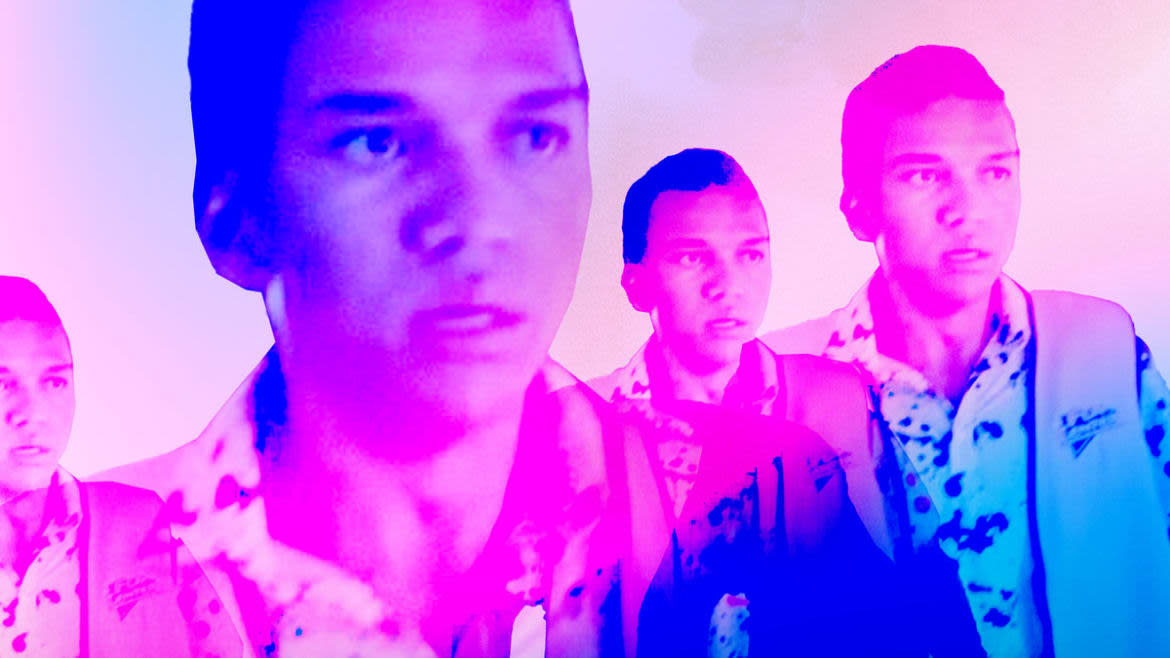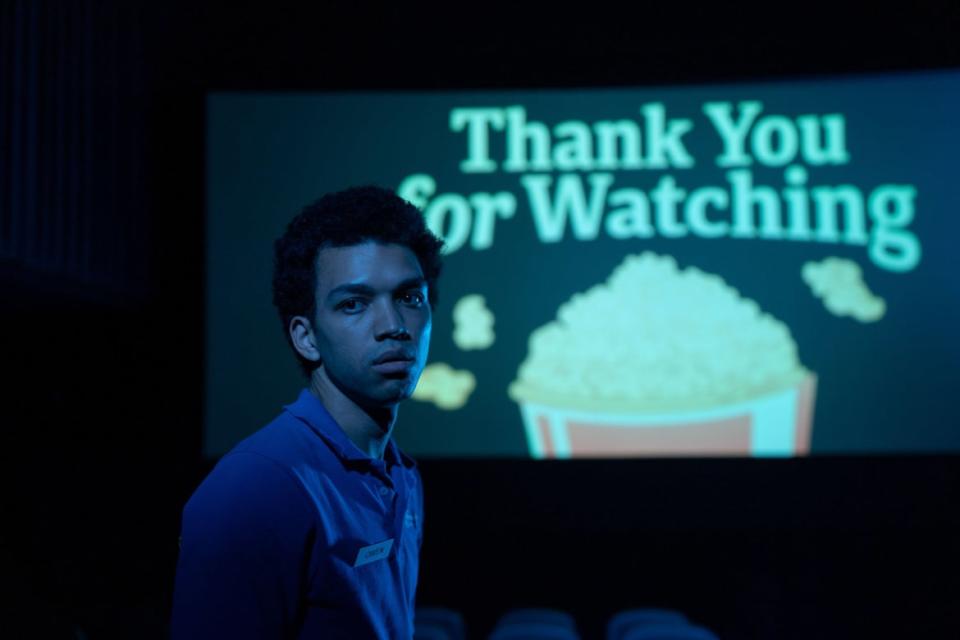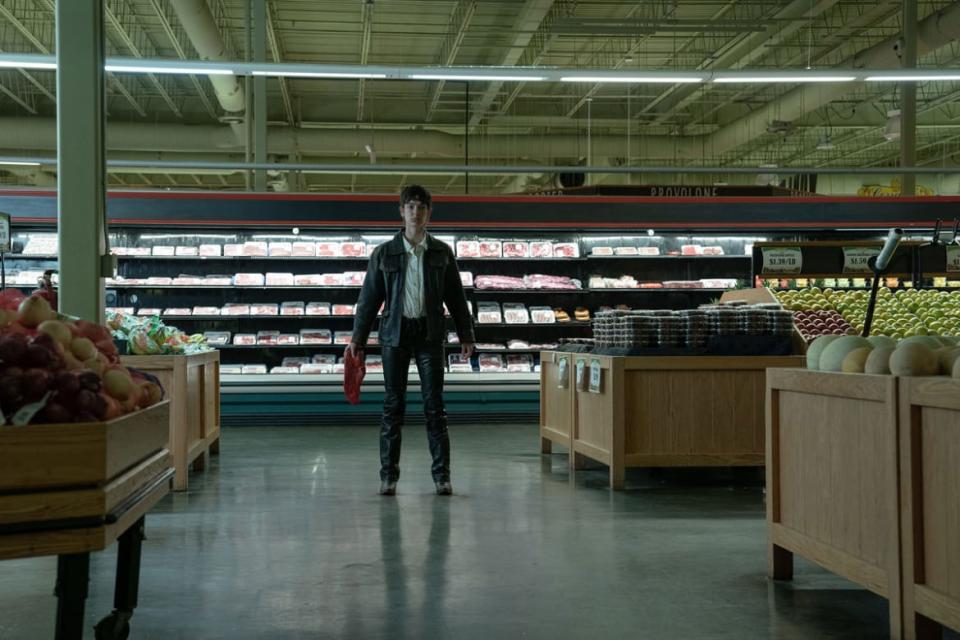Is the ‘I Saw the TV Glow’ Ending Hopeful or a Total Downer?

“There is still time.”
These words are written in chalk on the street in writer-director Jane Schoenbrun’s latest film I Saw The TV Glow, bold and bright for both its protagonist, Owen (Justice Smith), and the audience to see. It’s a message that’s clear for the young man whose life continues to pass him by, each day seemingly another exhausting trudge and an onslaught of disappointment. Since his childhood, Owen has been on the margins of his own life, his only solace coming from his friend Maddy (Brigette Lundy-Paine) and the television show she provided him with VHS tapes of, The Pink Opaque. The teen sci-fi show isn’t just fiction, but strongly implied to be the “real” world, with Owen trapped in the show’s “Midnight Realm”—an eerily familiar suburbia populated by minions of the “big bad,” Mr. Melancholy (Emma Portner).
As time slips him by, Owen remains unable to find pleasure in the things he once enjoyed, back when he was accompanied by Maddy, his lone friend who left him after she discovered her true self within The Pink Opaque, and he rejected her offer of helping him do the same. The protagonists of the show, Tara and Isabel (Lindsey Jordan and Helena Howard), aren’t just implied mirror images of Maddy and Owen, respectively, but their fully realized selves; the characters are the most obvious allegory of a fulfilling transition that trans/non-binary filmmaker Schoenbrun provides for the viewer. That Owen rejects this transition—accepting himself as the woman that Isabel is—and instead chooses to live with this dysphoria, while continuing to be given the chance to change, is the core dramatic tension of I Saw The TV Glow.
Sundance: ‘I Saw the TV Glow’ Is a Haunting Neon Masterpiece
That scrawled message on the pavement is like a whisper from Isabel to Owen from beyond the Midnight Realm, etched into his life but, tragically, always ignored. As the film comes to a close, with Maddy gone from this world where he remains trapped, Owen screams for help in the middle of a birthday party at the arcade where he works, surrounded by the same grotesque coworkers he’s known since his teens. It’s not just a soul-draining job but also a part of this horrifying facsimile of reality, like a simulation with nothing more to offer than complacency and an idea of normalcy that is slowly, but surely, killing him. His cries aren’t just ignored; they don’t even seem to make an impact on anyone around him, and the last thing the audience sees before the credits is Owen wandering through his dead-end job, apologizing to every single person around him. Though it may seem like the apology is for his outburst, it reads as something more: an apology for his mere existence. He may even be considering breaking free of this false identity.
Audiences and critics alike have commented on I Saw the TV Glow’s final moments since its release in early May, with plenty having perceived it as a downer. Rightly so, especially when paired with a climactic scene of Owen opening himself up in the midst of a panic attack to find a television glowing within his chest (an apt visual metaphor for self-discovery and acknowledgment of the truth that lies within). Some have been less than generous about Schoenbrun’s work, like non-binary reporter Nico Lang, who uncharitably accused the film of being like TV show with a non-ending. Instead, they argue, it offers a cliffhanger that is saving the real ending “for a second serving,” and claiming, “I don’t buy that Schoenbrun didn’t have the time to give Owen a happy ending—or any kind of ending.”

Justice Smith in I Saw the TV Glow.
To other queer critics, the ending implies a true moment of change, one that trans writer Emily St. James believes is optimistic because of the film’s fixation on there still being time. Where Lang accuses the film of being “90 minutes of oblique symbolism”—a baffling accusation to make of a film that has spurned so much discourse around what its relatively straightforward imagery means—St. James dissects the film’s third act, the much-discussed “egg crack”, and how the film’s every preceding frame influences the “deliberately anticlimactic, non-cathartic” finale.
Certainly there is the possibility of gender euphoria, after this moment of clear self-reflection. After all, Schoenbrun has noted that they believe getting “Owen to a place of true self-love and self-acceptance [as a trans person] would take at least another movie,” but that “just because you’ve now finally seen yourself clearly doesn’t mean that the half a lifetime of damage that repression has instilled in you is going to go away.” Ultimately, even positive critiques of the film acknowledge that there is a limitation to how long we have to make a meaningful change before our demise; as St. James says, “There is still time until there isn’t.”
‘I Saw the TV Glow’: Meet the Director of the Coolest Movie of the Year
The most compelling reading lies within what Emily said, somewhere between the possibility of growth and stasis. Perhaps the best supported read of Owen’s journey is a tragic one: he may have seen what exists inside himself—that he is not Owen, but rather Isabel trapped in a grave of Mr. Melancholy’s making—yet he has chosen to ignore it. This isn’t the first time he’s chosen to ignore the signs; he does this twice prior by choosing to never leave town with Maddy both times she disappears, not even when she explicitly tries to take him with her. His fear of change, of transition, is crippling, leaving him stuck in an endless, disconnected loop of going to work and watching an old television show that is no longer familiar nor comforting. Maybe it is a reminder of the way that nostalgia obscures reality, but it’s hard not to think the closer Owen gets to self-realization, the more the presentation of The Pink Opaque and its horrors look entirely fake. And if The Pink Opaque isn’t real, it might be that the nightmare he’s living is.
As plenty of trans folks have tweeted—both jokingly and sincerely—the film’s nightmare of an ending is simply reality for many trans people and the lives they lead. The world that surrounds us is inherently designed to keep us closeted, to keep us wondering “what if” until we make a leap that is, frankly, terrifying for many people. To connect a piece of fiction like this to an actual instance of a trans woman being forced further into the closet and obscurity for fear of her own life, look no further than Isabel Fall. Her first published short story, January 2020’s “I Sexually Identify as an Attack Helicopter,” attracted so much vitriol that it essentially destroyed her life and any hope of transitioning.
St. James published a piece on what happened to Fall in June 2021, 18 months after she became the victim of a harassment campaign. “Trans people—trans women, especially—can find their first few steps as themselves in public particularly stressful,” St. James wrote. “That stress is why it’s so often important for us to have safe ways to explore who we are, under whatever veil of anonymity we can concoct for ourselves. When we’re behind that veil, we can divorce ourselves from the identities we were assigned at birth, at least a little bit. To have that veil punctured is a great violence.”

Brigette Lundy-Paine in I Saw the TV Glow.
Fall’s own words cut deeper when thinking about Owen: “Isabel was somebody I often wanted to be, but not someone I succeeded at being.” I can’t help but think of this as the perfect summation of Owen, a person who has, rather consistently, been scared out of exploring their identity as Isabel (and that they share a chosen name feels especially prescient). It’s not that Owen never had people in his life who support him for who he really is: Maddy always emphasized that Owen is really Isabel and encouraged Owen to embrace that, and his mother Brenda (Danielle Deadwyler) was something of a shield for him from his father and a source of comfort, despite her death during Owen’s teens.
Even though Brenda is unable to do much against the authoritarian force that is Owen’s father (Fred Durst), who may very well be Mr Melancholy himself, if not one of his minions, there seems to be some level of knowledge that her child needs her love and presence. It isn’t just that she wants to let him watch The Pink Opaque despite being a “girls’ show” as her husband says, but she is aware there’s something different about her child. Though it may not seem like much, when Brenda says, “I just want to know that you’re on the right path,” to Owen before dying, she is letting him know that she loves him, no matter what.
How ‘I Saw the TV Glow’ Star Brigette Lundy-Paine Became a ‘Space-Alien Cowboy’
His love for these women is why, when Owen is screaming at the arcade, he yells for his “mommy” (which Schoenbrun has noted is as much for Maddy and Tara as his actual mother). They’re the only ones who knew him as he really was in “the real world”—or, at least, as he really dreamed of being.
But as much as the film implies that Owen’s true reality is within The Pink Opaque, the world where Owen feels trapped is an actively hostile one. Terror comes in the form of a father who withheld any opportunity to explore his identity, who literally pulled him out of the television Owen smashed himself inside of after watching the finale of The Pink Opaque, a moment where he might have actually had a chance to change. Exhaustion comes in the form of a sullen workplace where he’s surrounded by toxic masculinity (exquisitely presented by Conner O'Malley), where he’s made to feel othered by his male coworkers.
And who, if anyone, does Owen have to run to? The mother of an old friend who, while seemingly safe, is not capable of offering anything more than temporary comfort? His peculiar neighbors (played by The Adventures of Pete & Pete stars Michael Marrona and Danny Tamborelli, in a clear reference to one of the film’s most obvious inspirations) that seem just as villainous as his father and Mr. Melancholy? No, there’s no one. Not Maddy. Not his mother. Not The Pink Opaque. Not even Isabel, the woman he knows exists within him.
All of these experiences—from the fictional to the real, neither one less valid—are exactly why the ending isn’t as happy or hopeful as some people want it to be. Every single scene that precedes that finale contextualizes Owen’s decision not to run through those doors, not to embrace his identity immediately, to continue to go through the motions and apologize to everyone around him. Even for the boldest among us, transition does not happen at the snap of a finger, no matter how much some like to believe it can.
Maybe the glow of the television will offer a new life for Owen, but as it stands, things aren’t looking up for him. And that’s fine. You can call it a cautionary tale, or a scare tactic, but I think of it as painfully true. I Saw The TV Glow isn’t a tale of pure optimism, nor is it less than a complete picture simply because one doesn’t agree with where it ended. Jane Schoenbrun has presented an entire lifetime unfolding in front of us; we watch Owen grow from a middle school boy to a middle-aged man. No matter what discourses may unfold because of his actions, Owen did not choose the TV glow and, quite possibly, never will. But, with any luck, viewers of the film who identify with him will opt to change the channel instead of being lulled to sleep by the static, and that’s what matters most.
Get the Daily Beast's biggest scoops and scandals delivered right to your inbox. Sign up now.
Stay informed and gain unlimited access to the Daily Beast's unmatched reporting. Subscribe now.
